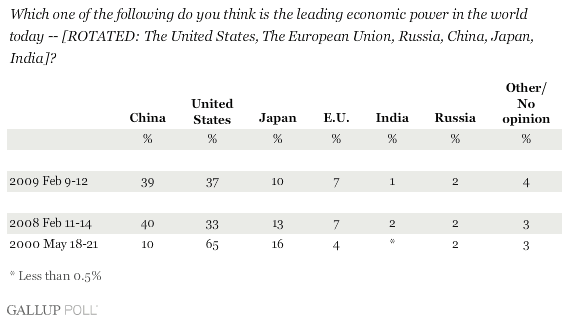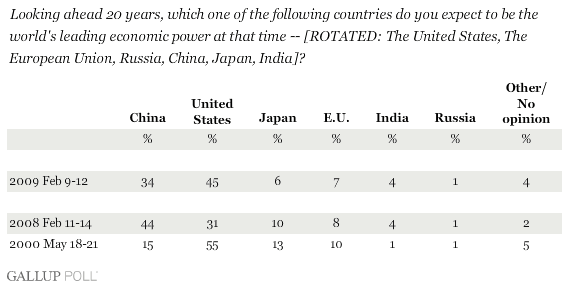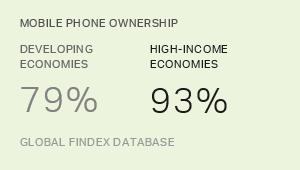PRINCETON, NJ -- In spite of the United States' current economic troubles, Americans have a brighter view than they did a year ago about the country's global economic competitiveness. In February 2008, Americans were more likely to name China than the United States as the "leading economic power in the world today." Today the United States and China are about tied.
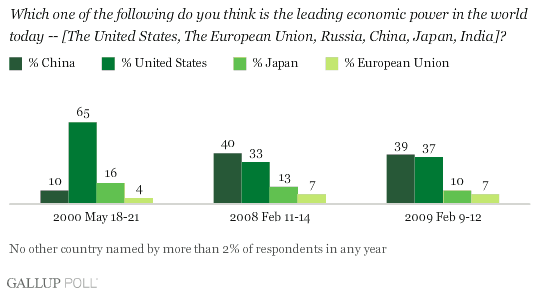
Furthermore, by 45% to 34%, Americans now believe the United States, not China, will be the world's top economic power in 20 years. This is a sharp reversal from February 2008, when Americans named China over the United States by about the same margin.
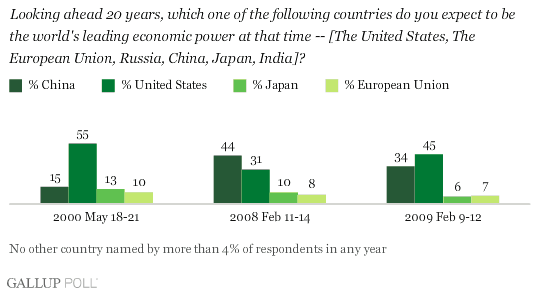
The 2009 data come from Gallup's annual World Affairs survey, updated Feb. 9-12. For both questions, ���۴�ýoffered respondents the choice of five countries plus the European Union.
���۴�ýfirst asked the pair of questions in May 2000, when the United States was unrivaled as the perceived economic powerhouse. In 2000, more Americans thought Japan, rather than China, was the current leading economic power (16% vs. 10%), and Japan and the European Union were not far behind China in perceptions of which country would be the leading power in 2020.
Perceptions changed dramatically in 2008, with the U.S. economy flagging and China's rapid economic growth gaining visibility. . (See table at end for full trend.)
Democrats Show Renewed Confidence in United States
Recent news that the worldwide financial crisis is impinging on China's rapid economic growth could be influencing Americans' perspectives on the United States' global competitiveness. However, politics appears to be the major factor in changes in these views.
Democrats -- -- are much more likely to predict the United States will be the leading economic power in 20 years than they were a year ago: 51% today versus 28% in 2008. Independents are a bit more likely to name the United States (37%, up from 23%), while there has been no change among Republicans.
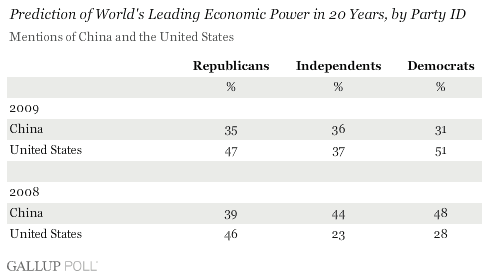
Current Perceptions of Top Economic Power
The current finding that only 37% of Americans believe the United States is the world's greatest economic power may not be surprising given the attention paid to China's remarkable economic growth in recent years.
Japan, which actually exceeds China in total economic output, falls well below both the United States and China in mentions of the dominant economic power today. Russia and India, neither of which rank among the world's top 10 economies (in terms of overall gross domestic product), are disregarded by most Americans as the leading economic power.
College graduates have only a slightly different sense of the global economic rank order than do those with less formal education. A year ago, however, the views of college graduates on this question were no different than the views of those with no college education.
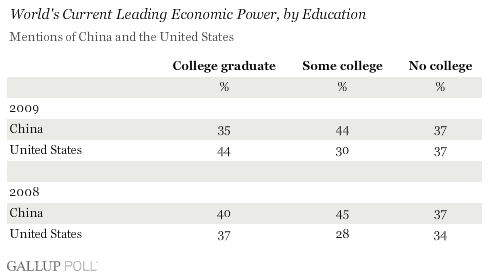
Since 2008, most of the shift in mentions by age from China to the United States in terms of which is the current economic leader has come from young adults. In 2008, 50% of those 18 to 34 years of age named China and only 23% named the United States. Today, young adults are about evenly divided, with 38% naming the United States and 36% naming China. The views of middle-aged and older adults have not changed much.
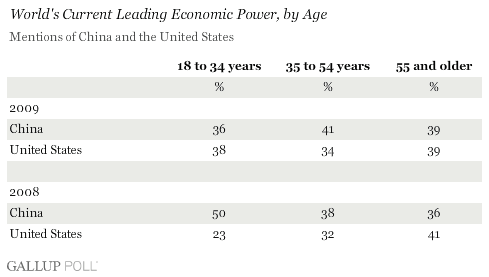
Outlook for Economic Power
The question of which country will be the leading economic power in 20 years is more subjective. Carrying current rates of growth forward, China could conceivably become the world's largest national economy in terms of GDP in that time frame; however, the unfolding financial crisis now adds considerable uncertainty to the equation.
���۴�ýfinds no generational differences this year in perceptions about which country will be the leading economic power in 20 years: all three major age groups are more likely to name the United States than China. A year ago, all three groups were more likely to name China; however, this tendency was particularly strong among young adults.
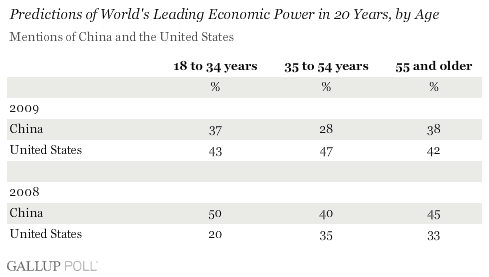
College graduates were in 2008, and remain in 2009, the most likely of all educational categories to believe China will be the future economic leader.
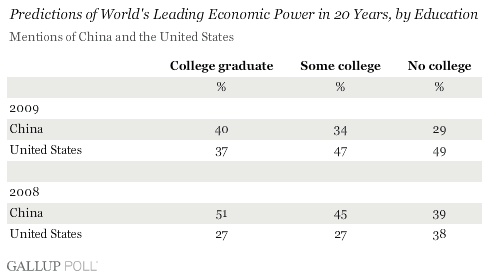
Bottom Line
Only 37% of Americans today recognize the United States as the world's dominant economic power, while a similar percentage believe that distinction goes to China. As far off the mark as this may be when looking at current GDP figures by country, it is quite different from perceptions a year ago, when only 33% named the United States and 40% selected China.
Americans' predictions for which nation will be No. 1 economically in 20 years have changed even more over the past year. The increased optimism about the United States' future economic standing is striking because it runs counter to . The fact that China's economy has stumbled along with everyone else's over the past year may be a factor in cracking the perception that China is unstoppable in attaining economic superiority. However, Democrats' (and, to a lesser extent, independents') confidence in Obama and the economic stimulus package appears to be a major factor.
Survey Methods
Results are based on telephone interviews with 1,022 national adults, aged 18 and older, conducted Feb. 9-12, 2009. For results based on the total sample of national adults, one can say with 95% confidence that the maximum margin of sampling error is ±3 percentage points.
Interviews are conducted with respondents on land-line telephones (for respondents with a land-line telephone) and cellular phones (for respondents who are cell-phone only).
In addition to sampling error, question wording and practical difficulties in conducting surveys can introduce error or bias into the findings of public opinion polls.
